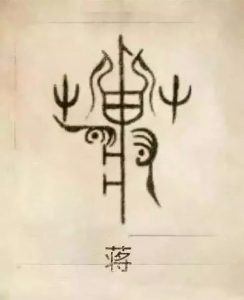Introduction
The Jiang(jiǎng) surname is one of the oldest and most storied surnames in China, with a history that spans over three millennia. For those interested in Chinese culture and history, the Jiang surname offers a fascinating glimpse into the evolution of Chinese society, the blending of different ethnic groups, and the enduring importance of family and tradition. This article will explore the origins of the Jiang surname, its historical figures, migration patterns, and its cultural significance, all while making it accessible to an American audience.

The Origin of the Jiang Surname: A Blend of Royal Blood and Multicultural Roots
- The Royal Beginnings: The Ji Bloodline
The Jiang surname traces its origins back to the early days of the Zhou Dynasty (1046–256 BCE), a period often regarded as the foundation of Chinese civilization. According to historical records, after King Wu of Zhou overthrew the Shang Dynasty, he granted his younger brother, the Duke of Zhou, the task of establishing a new order. The Duke of Zhou’s third son, Bo Ling, was enfeoffed in the region of Jiang (modern-day Huaibin County, Henan Province). Bo Ling’s descendants later adopted "Jiang" as their surname after the state was conquered by the Chu Kingdom in 617 BCE. This lineage is considered the "orthodox" branch of the Jiang surname.
- Multicultural Influences: A Tapestry of Ethnicities
Over the centuries, the Jiang surname absorbed influences from various ethnic groups, reflecting China’s long history of cultural integration:
Xianbei Influence: During the Northern Wei Dynasty (386–534 CE), the Xianbei ethnic group, under Emperor Xiaowen’s sinicization reforms, adopted the Jiang surname.
Mongolian Integration: In the Yuan Dynasty (1271–1368), Mongolian clans such as the Jiangjia merged with the Han Chinese, retaining the Jiang surname.
Southern Indigenous Groups: During the Han Dynasty (206 BCE–220 CE), some members of the Baiyue tribes in southern China adopted the Jiang surname as they assimilated into Han culture.
Historical Figures: The Legacy of the Jiang Surname
- Politics and Military
Jiang Wan (Three Kingdoms Period): A trusted advisor to Zhuge Liang and a key figure in the Shu Han Kingdom, Jiang Wan is remembered for his innovative military policies, including the "tuntian" system, which combined farming with military defense.
Jiang Shen (Tang Dynasty): A chancellor during Emperor Xuanzong’s reign, Jiang Shen played a pivotal role in compiling the Wenzong实录 (Records of Emperor Wenzong).
Chiang Kai-shek (Modern Era): A controversial but pivotal figure in 20th-century Chinese history, Chiang Kai-shek led the Nationalist government and played a central role in the fight against Japanese invasion during World War II.
- Arts and Culture
Jiang Zhiqi (Northern Song Dynasty): A close friend of the famous poet Su Shi, Jiang Zhiqi was a renowned calligrapher whose works, such as the Beike Tie, are celebrated to this day.
Jiang Jie (Southern Song Dynasty): Known as one of the "Four Great Poets of the Late Song," Jiang Jie’s poem Yu Meiren·Listening to the Rain is considered a masterpiece of Chinese literature.
Jiang Shiquan (Qing Dynasty): A prominent playwright, Jiang Shiquan’s works, including Linchuan Dream, had a profound influence on Chinese opera.
3.Science and Education
Jiang Bingran (Modern Era): A pioneer in Chinese meteorology, Jiang Bingran founded the Qingdao Observatory, laying the groundwork for modern weather science in China.
Jiang Mingqian (Contemporary Era): An accomplished organic chemist, Jiang Mingqian’s discovery of the "homologous linearity rule" earned him the National Natural Science Award.
Migration and Family Traditions: From Central China to the World
Early Migration
After the fall of the Jiang state, its descendants migrated from Henan to Shaanxi and Shandong, where they established the "Le’an" branch, named after a region in modern-day Shandong.
Southern Expansion
During the Eastern Han Dynasty (25–220 CE), the Jiang family migrated south to Yixing, Jiangsu Province, and later spread to Zhejiang and Fujian. Notable figures like Jiang Ji, a prominent official in the Cao Wei Kingdom, emerged from these southern branches.
Overseas Diaspora
In the Ming and Qing Dynasties, Jiang families from Fujian and Guangdong migrated to Southeast Asia, forming an integral part of the overseas Chinese community.
Family Traditions
The Jiang family has long emphasized the importance of ancestral worship and family values:
Ancestral Halls and Genealogies: The Jiang ancestral hall in Yixing, Jiangsu, preserves detailed records of the family’s lineage, dating back to Jiang Cheng.
Family Mottos: Many Jiang families adhere to mottos like "farming and scholarship" and "loyalty and filial piety," which have guided generations of Jiang descendants.
Cultural Impact and Modern Influence
- Economic Contributions
The Chiang Family in Taiwan: The Chiang family played a central role in Taiwan’s economic modernization, spearheading initiatives like the "Ten Major Construction Projects."
Ningbo Jiang Business Group: This influential business group has interests in shipping and finance, with assets exceeding $100 billion.
Silicon Valley Innovators: Descendants of the Jiang family have founded 23 tech companies in Silicon Valley, including AI chipmaker Graphcore.
- Cultural Preservation and Innovation
Digital Genealogy: The Jiang family association has developed a 3D genealogy system, connecting over 900,000 members worldwide.
Cultural IP Development: Jiang Jie’s Yu Meiren has been adapted into an immersive theatrical experience, performed in 23 countries.
Metaverse Ancestral Halls: Using blockchain technology, the Jiang family has created virtual ancestral halls, attracting over 100 million annual visits.
- Philanthropy
Jiang Family Foundation: This foundation supports 136 Chinese-language schools globally, with 37% located in Africa.
STEM Scholarships: Over the past decade, the foundation has funded 127 doctoral students in aerospace engineering, including a Chinese-American engineer at SpaceX.
Cultural Heritage Preservation: The foundation has documented 43 traditional Jiang family crafts, such as the secret techniques of Yixing purple clay pottery.
Conclusion
The Jiang surname is more than just a family name; it is a living testament to China’s rich history and cultural diversity. From its royal origins in the Zhou Dynasty to its modern-day global presence, the Jiang family embodies the resilience, adaptability, and enduring values of Chinese civilization. Whether through historical achievements, cultural contributions, or technological innovation, the Jiang surname continues to leave an indelible mark on the world.